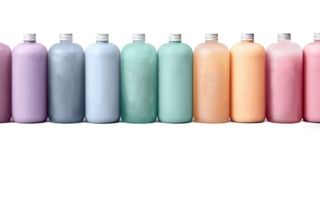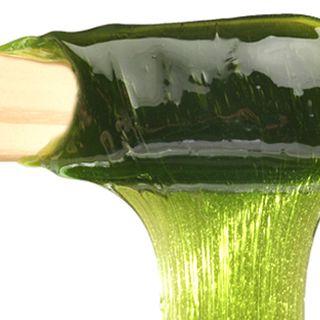
Untrending: Personalized Shampoo Is Just Regular Shampoo That Seems Premium
The more specific the shampoo’s purpose, the more likely it’s just marketing speak.

In Untrending, we side-eye the latest fads so we know what we’re getting ourselves into — and what (if anything) we’re getting out of them.
Bad hair days are miserable afflictions nobody deserves, yet everyone must deal with. While scores of products in the hair-care lexicon have tried to tame messy hair into lustrous, soft locks, dissatisfaction with hair texture, volume, and quality is still a problem. A few new players in the market are trying to provide solutions with a — literally — unique twist. Haircare products can now be customized to suit individual hair and scalp needs, complete with cute packaging and the buyer’s name on the bottled concoction. All this sounds groovy, but does personalized shampoo actually work?
Personalized shampoos are hair wash products formulated after the customer takes a quiz that determines the unique ingredients they need to treat their specific hair type and issues. These quizzes ask information about the customer’s hair texture, dandruff, oily scalp, modifications, and daily care. While most of this process is standardized across brands, some companies also ask the region in which the customer is based or will be based while using the product, to make it suitable to that region’s climate and water quality. Others, bordering on the absurd, ask for everything from body type to information about bowel movements to find individual ayurvedic doshas, i.e. types of natural/universal energy that influence life — all to wash hair.
If shampoo is made specifically to target unique issues, it should work perfectly for the person it’s tailored to — but personalized shampoo brands have received mixed reviews, which counter the entire premise of the product’s effectiveness. A major reason behind this is that most of the hyper-specific treatments advertised by shampoo brands are mere marketing tactics.
Related on The Swaddle:
The Shame and Scandal of Indian Women’s Hair Follicles
Custom shampoos try to differentiate themselves from regular shampoos by stating that the latter employs a one-product-fits-all approach, which doesn’t work for all, as all hair is different. Customers can also typically pick their favorite scent, product color, and can name the bottle after themselves. This is important because it creates a sense of personalized detail, uniqueness and gives the product a premium feel.
However, dermatologists are skeptical of customized shampoos being holy grail products. Dr. Maryanne Senna, the director of the Hair Academic Innovative Research Unit at Massachusetts General Hospital, told the New York Times that unless individuals have very oily hair, dandruff, sensitivity or allergy, she does not recommend specific products. She said, “There are some [shampoos] we very clearly know can be drying, but then there’s a lot of stuff [personalized shampoo manufacturers] use that has no evidence to back it up,” Dr. Senna added, “Whether it’s the hair holy grail comes down to perception.”
The reality is that the various specific things that most shampoo brands claim to do are mere marketing tactics. “There are a limited number of shampoo types marketed, although they have lots of different names. In general, these shampoos include normal, extra body, moisturizing, baby, two-in-one, (medicated) and specialty shampoos,” writes cosmetic chemist Perry Romanowski on his resource blog Chemist’s Corner. Romanowski, who has helped formulate products like Tresemme and VO5, also told Slate that people already customize the shampoo they use by measuring out the quantity they need and/or watering it down. He said, “In the shower, you’re going to use the amount you need to clean your hair.”
Personalized shampoo is just regular shampoo that gives a customer some control over the ingredients, fragrance, and packaging.
The personalized shampoo trend grew via brands like Form, Function of Beauty, and Prose creating a buzz on social media in the West. With beautiful packaging and curiosity surrounding the ‘custom’ label, soon many influencers and media portals started testing and giving positive reviews to custom shampoo brands. In India, though the personalized shampoo trend is nascent, brands like Freewill, Bare Anatomy, Freshishtry, and Vedix are gaining prominence via the same route as the international products.
However, it is important to note that all these products are merely cleaning dirt and oil residue from hair, while occasionally moisturizing and making hair smell good. The only customized shampoos that ‘work,’ i.e. creates active change in the scalp and hair environment, is medical shampoos formulated for dandruff, lice, and other such highly specific problems.
Personalized shampoo is just regular shampoo that gives a customer some control over the ingredients, fragrance, and packaging of their shampoo. Due to the personalized nature of the product and packaging, custom shampoo does break the bank a bit. India-based Freewill sells its (30ml) hair oil, (200ml) shampoo and (200ml) conditioner combo for Rs. 2,150. Another Indian brand, Bare Anatomy, prices its 300ml shampoo bottle at Rs. 749. All of these products are formulated to be used a few times a week and are also sold as monthly subscriptions, which can cost tens of thousands a year. In comparison, one of the more expensive bottles of shampoo off the shelf — Tresemme — costs Rs. 500 for an entire liter.
While paying a premium amount purely for the aesthetic might not be for everyone, people who like greater control over their shampoo ingredients due to allergies might benefit. For the rest, drugstore picks are inexpensive and get the job done.
Aditi Murti is a culture writer at The Swaddle. Previously, she worked as a freelance journalist focused on gender and cities. Find her on social media @aditimurti.
Related


Study: It’s Better to Tell Children the Truth About Their Adoption Sooner Than Later
